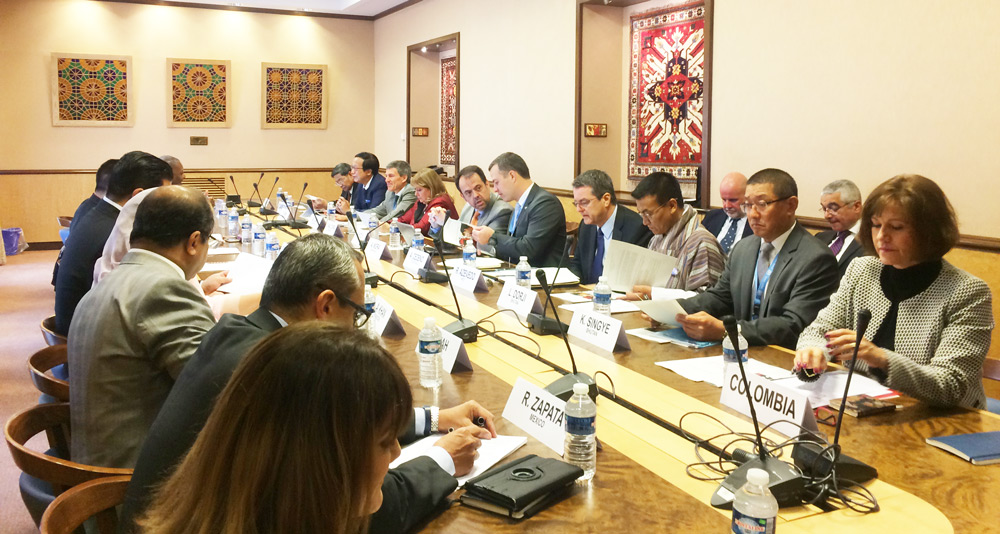ELECTRONIC COMMERCE

DG Azevêdo at the first Ministerial Meeting of the “Friends of E-Commerce for Development”
More
Friends of E-commerce for Development ministerial meeting
Remarks by DG Azevêdo
Minister Mora,
Secretary-General Kituyi,
Excellencies,
Ladies and gentlemen,
Good morning. I am pleased to join you at this first Ministerial Meeting of the ‘Friends of E-Commerce for Development’.(1)
I had the chance to address a meeting of the group at Ambassador-level in December last year. I’m glad to see this excellent initiative evolving today.
Your presence here in Geneva highlights your commitment to this conversation. It shows your desire to ensure that e-commerce contributes to further growth and development in your countries – and across the world.
And I think that this is a very timely debate.
E-commerce is changing the economic landscape – and the way we trade and live.
Research from PWC on purchasing habits in 25 countries, both developed and developing, showed that 54% of respondents already buy products online weekly or monthly.(2) In fact the numbers were even higher in some developing countries.
And the market is growing rapidly.
Between 2013 and 2015, the value of global online trade jumped from 16 trillion to 22 trillion dollars.(3)
This is significant because of the opportunities that it represents, especially for the smaller players.
For small and medium-sized enterprises, e-commerce can significantly lower the costs of doing business across borders.
It also provides a platform that allows producers to access the global marketplace, reach a broader network of buyers and, potentially, to participate in global value chains.
For consumers, it means access to a broader selection of products, from a wider range of suppliers, and at more competitive prices.
In this way, e-commerce can help to improve livelihoods, promote further inclusivity in the trading system, and boost development.
It is very positive that you are looking at how to make the most out of these opportunities.
However, there is still a long way to ensure that everyone can partake in these digital flows. In many places e-commerce is not yet a reality.
Four billion people in the developing world remain offline today.
This is an immediate challenge to us all.
And we should seek to put a particular focus where the need is the greatest. For example, only one in four people in Africa use the internet – and only one in seven people in LDCs.
E-commerce should not be something that widens the development gap. It should be a means of closing it.
And while being connected is a necessary condition, it is not enough.
E-commerce is not only about the clicks. It is also about the bricks. And that means infrastructure.
We need to ensure that the right infrastructure is in place, as well as appropriate policy, regulatory and payment systems to provide the trust which is essential in any transaction.
Any international initiative to unlock the potential of e-commerce for development will have to tackle these issues. It will have to help with providing support to improve capacity and infrastructure in those countries that need it the most.
We have a strong record of helping the most vulnerable to join trade flows.
Programs like the WTO Aid for Trade Initiative already do very important work to help build trade capacity in developing and least developed countries. UNCTAD’s ‘eTrade for All’ initiative is another positive example here – and we’ll be hearing much more about this over the next few days.
Reforms to the trading system can also make a big difference.
The WTO’s Trade Facilitation Agreement, the first global trade deal of the 21st century, will be particularly important. Under this agreement, trade costs could be reduced by 14.3% on average, and by significantly more in many developing countries. And the agreement provides for the necessary practical support to help members with their implementation. We are working with a range of donor members and partners to mobilise that support.
Working together, we can find creative solutions to bridge gaps and help more people access the opportunities and benefits of e-commerce.
That’s why today’s meeting is so welcome.
This has to be a collective effort.
Many members – and not only the Friends of e-Commerce for Development – want to set a path forward for discussions on e-commerce, with a view to ensuring that e-commerce supports growth and development in the years to come.
Engagement is high. Many ideas have been put forward – by WTO members, by the private sector and by other stakeholders.
If we are going to advance, we have to turn that engagement into real proposals. We need to focus on specifics.
This week is an excellent opportunity to have discussions with the full range of stakeholders. But of course progress requires routine engagement.
We need to continue this work throughout the year. The WTO acts as a platform to have these discussions among all members that want to do so.
I will be there to help and facilitate this as much as I can – but, as always, it is for members to set the direction and the pace. It is up to you to drive this work forward, put proposals on the table, and build convergence behind them.
So there is a lot of work to do! I wish you a very successful event today.
Thank you.
Share
Share
Problems viewing this page? If so, please contact [email protected] giving details of the operating system and web browser you are using.